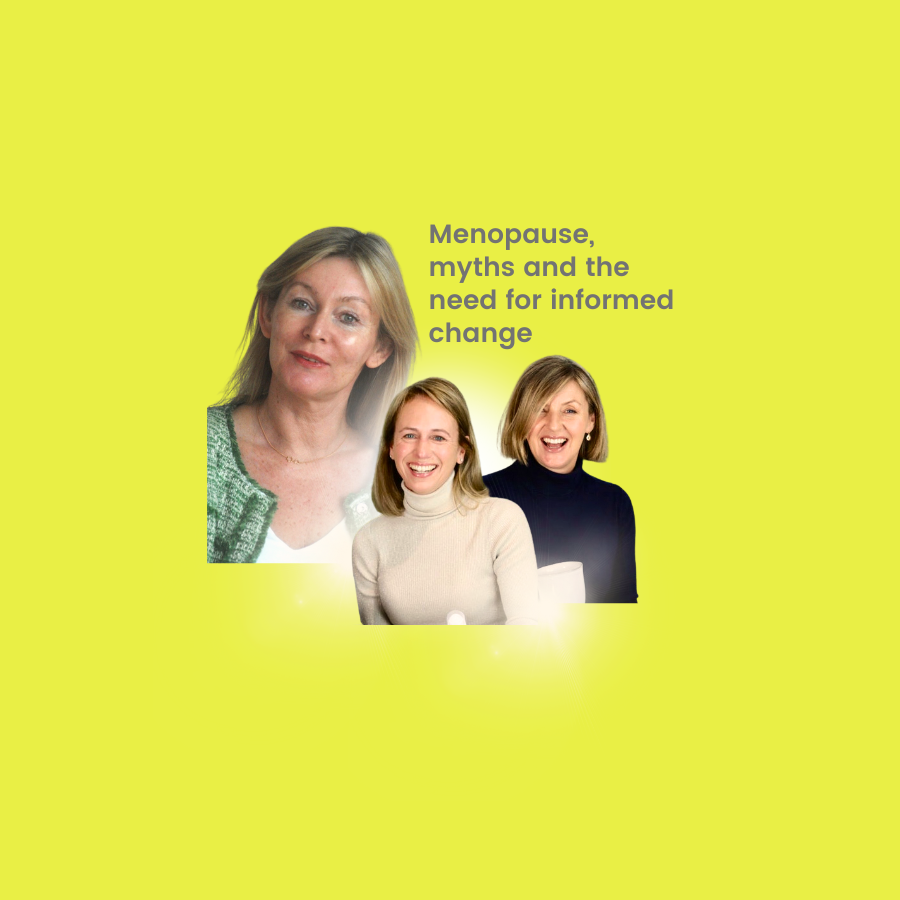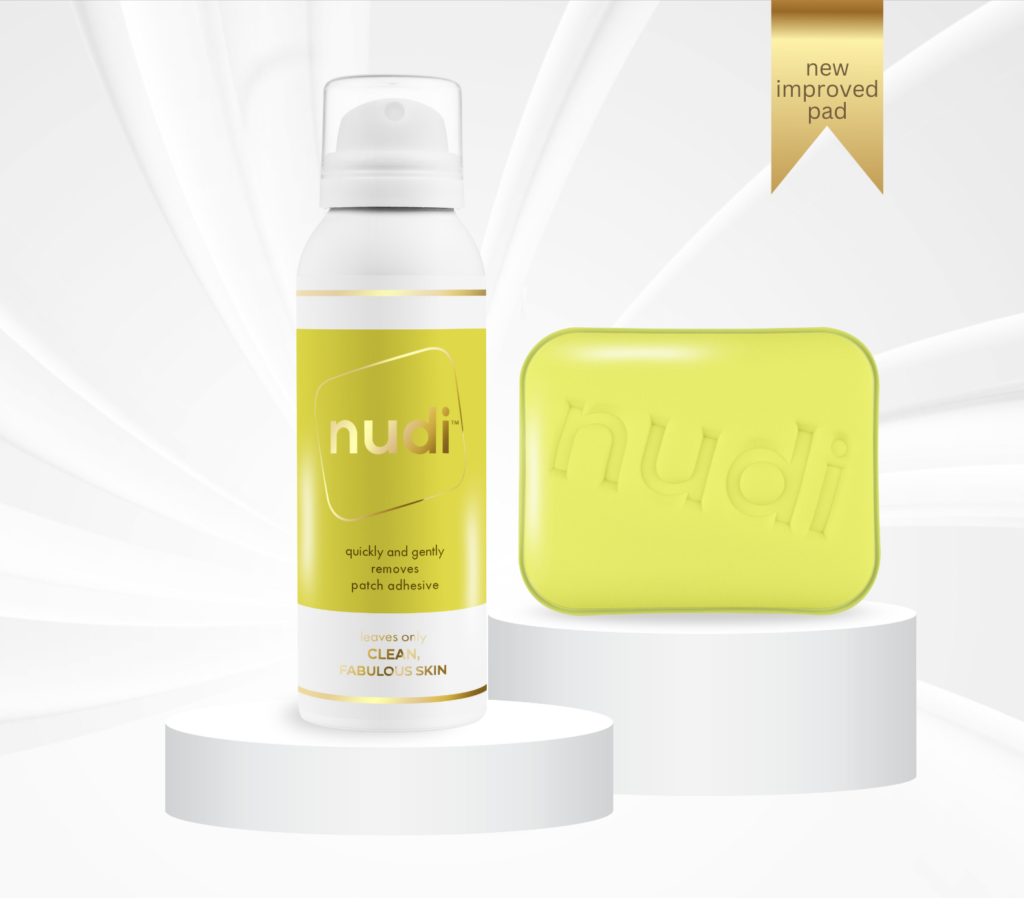
Welcome back to the Nudispray blog! Today, we’re diving into the frequently misunderstood world of menopause. We spoke with Fiona Clark, journalist, menopause advocate, and co-founder of the Menopause Research and Education Fund, to sift through common myths, expose the research gaps, and spotlight why meaningful change is so urgently needed.
Where Are We in the Menopause Conversation?
First off, we couldn’t help asking Fiona how she sees the current state of menopause awareness. She observed that although public conversations are improving, it’s still easy to find misconceptions – especially around Hormone Replacement Therapy (HRT). Many people hear claims like “HRT prevents dementia” or “HRT prevents heart disease,” but, as Fiona points out, there isn’t conclusive evidence for those benefits yet. The research may change someday, but for now, it’s essential to separate fact from unproven hope.
The Role of Big Pharma and Lack of Research
Some people wonder if a lack of menopause-specific research stems from the fact that some symptoms can be treated with existing drugs, such as antidepressants or painkillers – so pharmaceutical companies might not feel the urgency to push for more targeted options. Fiona, however, sees this as part of a broader systemic issue rather than a single corporate conspiracy. Historically, women have been sidelined in medical research. In 1977, the U.S. FDA excluded women of childbearing age from clinical trials, which left us with decades of scant data on women’s health. Even now, women are still massively under-represented in studies and research in the UK receives a minuscule 0.3% of health research funding – a glaring oversight that underscores how women’s health issues haven’t been taken seriously enough.
Economics as a Catalyst for Change
Change is coming, though, and it’s often fueled by economic realities. Fiona reports that for every £1 spent on menopause care and research, higher-income countries can see a return of £3.50 – and developing nations can see £2. That’s a significant return on investment. When you consider that women in their 40s, 50s, and beyond make up a critical part of the global workforce, it becomes clear that ignoring menopausal health can have real financial repercussions. Governments and institutions are finally taking notice, because healthy, supported midlife women are vital to economic productivity.
Beyond Perimenopause – The Silent Symptoms
Most of us recognize hot flushes, irregular periods, and mood swings as hallmarks of perimenopause. Fiona wants people to realize there’s a lot more under the surface. Post-menopause, the real health concerns that can creep up include rising cholesterol, bone density loss, metabolic changes, heart disease, bladder issues, and shifts in cognitive function. These might not grab headlines like hot flushes do, but they’re pivotal for long-term well-being. Looking after our health in our 40s and 50s sets the stage for better life quality in our 60s, 70s, and beyond.
The Problem of Misinformation and Medical Training
When people reach out for help, they often discover just how patchy and inconsistent medical advice can be. Fiona shared that medical students in the UK have historically gotten very little formal training in menopause – sometimes just an hour in their entire curriculum. While that’s starting to improve, it’ll be a while before newly trained doctors hit the workforce. Until then, many find their symptoms shrugged off or misdiagnosed. It’s not uncommon for someone seeking HRT to be offered antidepressants instead, simply because medical professionals aren’t always given the tools to recognize and address menopause effectively.
Barriers to Informed Choices
Even the most motivated individuals can hit roadblocks when trying to understand menopause, especially in communities with limited healthcare access or ongoing stigma around discussing reproductive health. Fiona pointed out that public health campaigns are sorely lacking. Imagine how helpful it would be to see posters on buses or trains, billboards in busy areas, or community forums normalizing the conversation. After all, it’s tough to research a topic if you don’t know if the symptoms you’re experiencing could be menopause related—or if you’ve been taught it’s taboo.
Getting the dose right
Hormones aren’t just about estrogen and progesterone. Fiona emphasized that testosterone plays a vital role in women’s health, but testosterone research specifically for women remains patchy. There’s a £2.6 million study in progress that’s looking into testosterone benefits, but results and policy changes don’t happen overnight. Everyone’s menopause is different and Fiona says it can be a case of trial and error to find what works for you. Fortunately, the products available on the NHS are available in different doses so can be tailored to your needs. She says, talk to your doctor if you find that you’re still having symptoms and they can adjust the dose.
Misleading Alternatives and Dangerous Myths
One common myth is that “bioidentical” or compounded HRT is automatically safer or more bespoke. Fiona is quick to caution that these products can be expensive and aren’t regulated for safety at all. Because hormone levels fluctuate from day to day, a single blood test doesn’t necessarily provide a reliable blueprint for treatment, which is why symptom control is the recommended method of assessing the correct dose. Evidence-based, rigorously tested options typically offer the safest route – so it’s worth being skeptical of flashy marketing claims that lack a strong research foundation.
A Call for Advocacy and Informed Empowerment
So, where do we go from here? Fiona stresses the power of advocacy. Ask tough questions, demand evidence-based care, and push for more robust research. The Menopause Research and Education Fund, https://mref.uk/ for example, aims to bridge the gap between science and real-world healthcare by funding projects that can change how menopause is understood and treated. Even small donations can add up to fund PhD researchers and long-term studies that shift the medical landscape.
Changing the Narrative – A Broader Cultural Shift
There’s also a broader cultural narrative at play. Some argue we should ditch the word “menopause” altogether, favoring terms like “hormonal insufficiency” to reduce stigma. Fiona isn’t entirely convinced that renaming is the answer; she believes the real power lies in reimagining menopause as an empowering stage of life, not just an ending. In the book she has just written,’Menowars’ she takes on Germaine Greer’s view of menopause as the, ‘ante-chamber to death’ arguing, people in their 50s and beyond frequently start new businesses, launch fresh campaigns, or rediscover passions. Changing how we talk about menopause can help more people see it as a launchpad for new adventures rather than a stop sign.
Conclusion: From Awareness to Action
Ultimately, menopause needn’t be a scary, isolating experience. With better information, a more empathetic care, and robust research, it can become a stage of life filled with possibility. As Fiona puts it, the most empowering version of menopause is one that’s informed. That means not just busting myths, but also demanding more from our healthcare systems and having the knowledge to advocate for ourselves. Let’s keep pushing for that knowledge, that visibility, and that sense of community – and watch the transformations unfold.
Frequently Asked Questions (FAQs)
- What is menopause?
Menopause marks the end of menstrual cycles and is diagnosed after 12 months without a period. It typically happens between ages 45 and 55 but can occur earlier or later. - What is perimenopause?
Perimenopause is the lead-up to menopause, characterized by fluctuating hormones and potential symptoms like irregular periods, hot flushes, and mood swings. - Is HRT safe?
For most individuals, HRT is considered safe and can significantly ease symptoms. Always discuss your personal risks and benefits with a qualified healthcare provider. - What are vasomotor symptoms?
These include hot flushes and night sweats, triggered by the body’s shifting hormone levels affecting temperature regulation. - Can menopause affect mental health?
Yes, it can. Mood swings, anxiety, and depression are commonly reported due to hormonal changes. If this is happening to you, it’s important to seek help and support. - Is menopause only about hot flushes?
Definitely not. It also impacts bone density, cholesterol, heart health, bladder function, cognitive function, and more. - What is bioidentical HRT?
Bioidentical hormones are chemically similar to those produced by the body. The hormones used in transdermal HRT medications are ‘bio’ or ‘body’ identical. Those that are compounded by a pharmacy individually, use the same, but they are not regulated for safety or efficacy. What that means is, there is no guarantee that what they say is in the product and that the amount you have been prescribed, is safe or effective, because they haven’t been studied. - Can you stay on HRT long-term?
We used to say ten years was the maximum, but thinking on that is changing and if you have no specific risk factors there may be nothing to stop you from continuing. It would be a decision made between you and your doctor. We need more research on this. It’s vital to have ongoing medical supervision and regular check-ups. - Why is menopause education important?
Understanding what’s happening in your body helps you recognize symptoms, make informed decisions, and reduce stigma. Knowledge is power! - How can I support menopause research?
Consider donating to reputable funds, sharing accurate information, and calling for public awareness campaigns. Collective action can fuel meaningful shifts in understanding and care.
Our Products

Adhesive Remover Starter Kit
Designed to remove the most stubborn patch or tape glue from all skin types in a neat travel sized pack .
- Nudi Spray™ 50ml
- Easi Pad™
- Nudi™ Patch Bag
£15

Glue Free Forever!
Subscribe & Save
Enjoy our great value subscription direct to your door without giving glue another thought.
- Nudi Spray™ 100ml
- Easi Pad™
- Cancel anytime
£16

Top Up!
Designed to remove the most stubborn patch or tape glue from all skin types in our larger 100ml can.
- Best Seller
- Nudi Spray™ 100ml
- Easi Pad™
